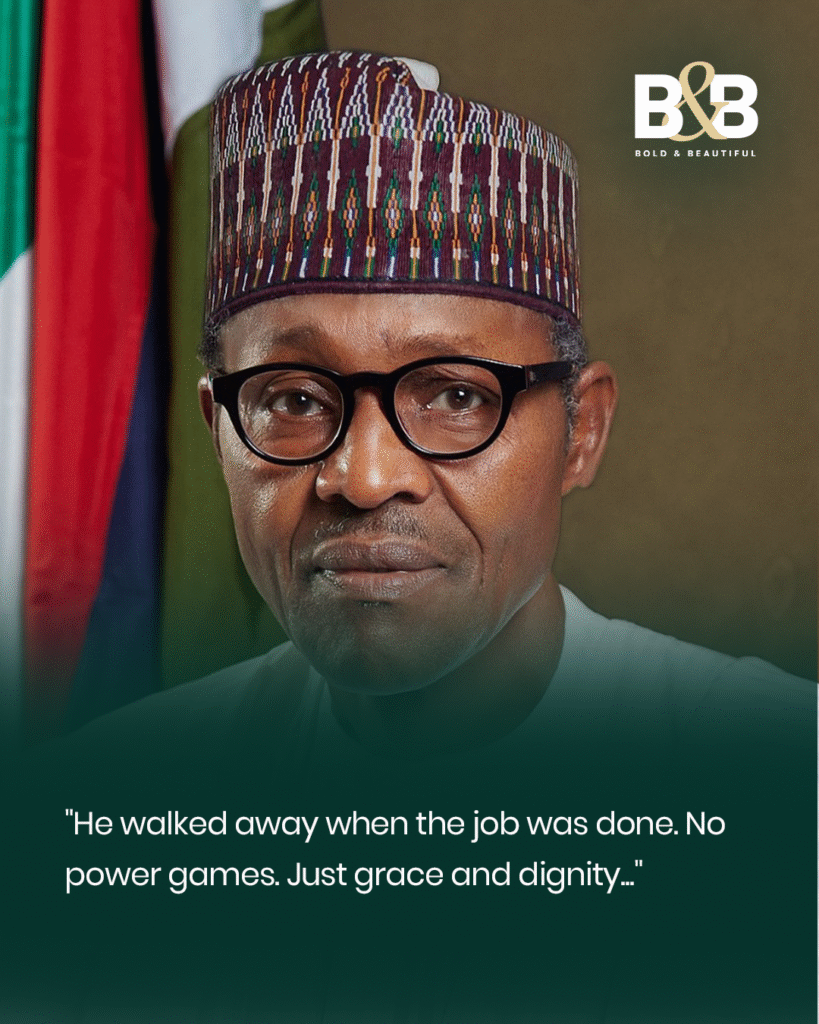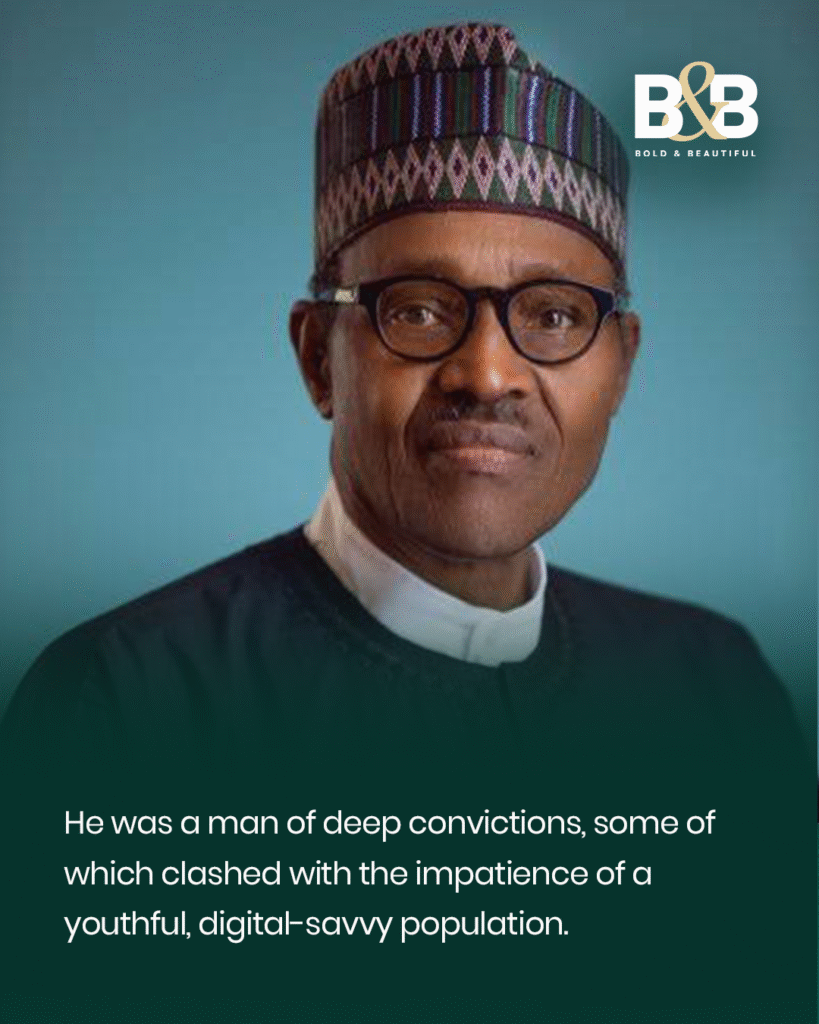As Nigeria reflects on the life and passing of one of its most consequential modern leaders, tributes are pouring in for President Muhammadu Buhari, the nation’s 15th Head of State and immediate past president. A man who divided opinion in life continues to inspire reflection in death, this time, with reverence, gratitude and a clearer view of his legacy.

From dusty barracks as a young military officer to the nation’s highest civilian office, Buhari’s life was a study in discipline, restraint and devotion to national service. His quiet demeanour often masked a tenacity that powered many of the policy battles he waged during his eight years as civilian president, from 2015 to 2023.

The Statesman and Reformer
Tributes from both local and international communities have focused on his decades-long service and resolute stance on national unity and discipline.
Former Vice President Yemi Osinbajo wrote:
“President Buhari served Nigeria with singular dedication. His belief in a more just and disciplined society never wavered. I had the honour of serving with him. Nigeria has lost a great son.”
Bola Ahmed Tinubu, Buhari’s successor, added in a national statement:
“President Buhari stood for integrity and accountability in public life. We honour his contributions to the nation and his quiet, yet determined leadership style.”
Under Buhari, Nigeria saw massive investment in infrastructure, especially in transport and energy. Roads and rail lines long abandoned were revived. The Second Niger Bridge, a decades-old promise to the southeast, was finally delivered. His administration also pushed forward the Lagos–Ibadan railway, revamped the Abuja–Kaduna rail, and initiated hydroelectric and gas pipeline projects that will serve generations to come.
Simplicity and Purpose
Social media tributes speak not only to policy but also to Buhari’s personal discipline and frugality.
“Baba Buhari lived a life of quiet integrity. No scandals. No flamboyance. Just service,” wrote @danielogunjimi on X (formerly Twitter).
“He didn’t smile much, but his policies built bridges, both literally and metaphorically,” added a post from Nigerian author Aisha Yesufu.
Indeed, while Buhari was often accused of aloofness, especially by critics who wanted faster reforms or clearer communication, many now say his silence often spoke volumes.
“He may not have spoken often, but when he did, he meant it. And he delivered,” shared Olawale Bakare, a civil servant in Abuja.
The Anti-Corruption Crusader
Perhaps the most talked-about pillar of Buhari’s presidency was his anti-corruption drive. While the effort faced criticism for being selective, it undeniably shifted Nigeria’s public sector culture. His Treasury Single Account (TSA) initiative streamlined federal finances. The Whistleblower Policy led to the recovery of billions of naira in public funds.
“President Buhari reminded us that integrity in office is still possible in Nigeria,” wrote human rights lawyer Abdul Mahmud in an emotional Facebook post.
“He laid the foundation. We must build on it.”
Defender of the Poor and Forgotten
In a country where the gap between rich and poor continues to widen, Buhari’s Social Investment Programmes (SIPs) offered a glimmer of hope to millions. The N-Power, School Feeding Programme, TraderMoni and Conditional Cash Transfers reached over 12 million Nigerians. These initiatives were the most ambitious social welfare schemes in Nigeria’s post-independence history.
“He brought food to my children’s mouths when I had none,” said Mama Kudirat, a market woman in Kaduna, during a community-organised prayer held in his honour.
A Military Mind, But a Democratic Heart
While Buhari came to power in 1983 as a military head of state, his 2015 victory marked a historic transition, a peaceful ousting of an incumbent president through the ballot, a first in Nigerian history. It was a moment of national maturity and a testament to Buhari’s lifelong commitment to discipline and order.
His role in signing the 2022 Electoral Amendment Act has also been widely hailed. The law allowed for electronic transmission of results, helping enhance election transparency in ways that had long been resisted.
His Final Act: A Quiet Retirement
After stepping down in May 2023, Buhari retired to his hometown, Daura, Katsina State, stating that he was “tired” and ready to live out his remaining days in peace. He resisted any temptation to meddle in successor politics, a rare quality in African leadership.
“He walked away when the job was done. No power games. Just grace and dignity,” commented activist and writer Japheth Omojuwa.
In Memory, A More Complete Picture
In death, a more balanced picture of Buhari emerges. He was a man of deep convictions, some of which clashed with the impatience of a youthful, digital-savvy population. Yet, many now agree that his contributions will continue to shape Nigeria for years to come.
“Buhari is gone, but the roads he built, the dignity he demanded of public officials, and the hope he gave to the poor, those remain,” said Bishop Matthew Kukah in a Sunday homily tribute.
The Final Salute
From Daura to Durban, London to Lagos, Buhari is remembered not just as a general or president, but as a symbol of a certain kind of leadership, one rooted in quiet strength and service.
As Nigeria mourns and remembers, one thing is clear: the man who once led with a stiff upper lip has left behind a legacy that speaks volumes.
May his soul rest in peace.





